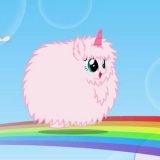This semester at school, I am taking a painting elective. I am learning a lot about painting, and my teacher said in my progress report that my skills are “improving with each project we do.” However, there is one aspect of the class that keeps me up at night.
I went to a special preschool for kids on the autism spectrum when I was younger. I have lived and attended school in the same town my entire life, and because of this, I have reunited with several of my buddies from preschool. One of these buddies is Raymond. Raymond has much more severe autism than I do, and he has an aide, Amy, who goes to classes with him. Raymond happens to be in my painting class this semester.
A typical day in painting class goes something like this:
I grab the painting that I am working on from my cubby, fill a plastic container with water, and get out my paintbrushes and pallet. I roll up my sleeves and get ready to work.
About 15 seconds later, I hear an unmistakable noise:
“WHO’S AFRAID OF THE BIG BAD WOLF, THE BIG BAD WOLF, THE BIG BAD WOLF? WHO’S AFRAID OF THE BIG BAD WOLF, THE BIG BAD WOLF, THE BIG BAD WOLF?”
It’s Raymond, singing his favorite song. This would have been fine in preschool, but now we’re freshmen in high school. Most high school students have moved on from the Big Bad Wolf, but Raymond hasn’t.
Millie is sitting at the next table over, mouthing the words to the song to her friend, Payton. Payton laughs at the “joke,” and my blood boils. It’s not Raymond’s fault that he can’t stop singing the song! He has autism, for crying out loud!
I then realize that I need more white paint, so I go over to the paint table and squeeze more on my pallet.
“DO YOU WANT TO GO TO RHODE ISLAND THIS WEEKEND? DO YOU WANT TO GO TO RHODE ISLAND THIS WEEKEND? I WANT IT TO BE APRIL 29TH, TWO THOUSAND AND FIFTEEN SO THAT WE CAN GO TO RHODE ISLAND THIS WEEKEND! IT IS SATURDAY. I DON’T WANT TO GO TO RHODE ISLAND THIS VACATION.”
Raymond normally repeats this monologue like a broken record throughout the rest of class in his Outside Voice.
“Ugh, here we go again,” Kayla, one of my classmates, grumbles.
“It’s not Raymond’s fault he has autism,” I politely explain to Kayla.
“Yeah, but not everyone with autism is annoying and repeats the same thing over and over again,” Kayla whines.
“Raymond can’t control his yelling,” I say, my tone calm and even.
Kayla grunts, rolls her eyes, and walks away.
All throughout the rest of class, I see kids mouthing Raymond’s words, humming the Big Bad Wolf song, rolling their eyes, and giggling to their friends about something poor Raymond has no control over. If I were a teapot, I’d be steaming and whistling.
Finally, class is over. As we clean up, people continue to subtly make fun of Raymond.
Even though it angers me when other people on the spectrum get made fun of, I know that it comes from a place of ignorance. People simply do not know what it means to live with autism.
In my mind, there are two categories of information about autism: the “can’ts” and the “cans.” The “can’ts” are things that people with autism have a hard time doing and/or negative perceptions of autistic people. The “cans” are things that come easily to people with autism and/or positive perceptions of autistic people. Unfortunately, people are educated more on the former than the latter. This creates a society where people with autism are seen as inferior to neurotypical people and are dehumanized as a result.
If neurotypical people learned more about the incredible things people with autism have to offer the world, they would have much more respect for autistic people. I think that there should be some sort of curriculum on autism, maybe in Health or Advisory, that focuses on what people with autism CAN do and teaches neurotypical people how to create an environment in which autistic people are able to succeed. If neurotypical people knew what autistic people are capable of, they would respect us and see us as equal to them rather than less than them. If school were an environment in which every student would be capable of succeeding, the learning that would take place would be so much more meaningful. And if no one steps up to the challenge of creating that curriculum, I’d be more than happy to do it (with help, of course).
People say that ignorance is bliss, but if ignorance is what leads to people misunderstanding each other and getting hurt as a result, how blissful is that? I say that education is bliss because it leads to understanding, tolerance, and, ultimately, respect and kindness.
This post has been contributed by a third party. The opinions, facts and any media content are presented solely by the author, and JewishBoston assumes no responsibility for them. Want to add your voice to the conversation? Publish your own post here. MORE


